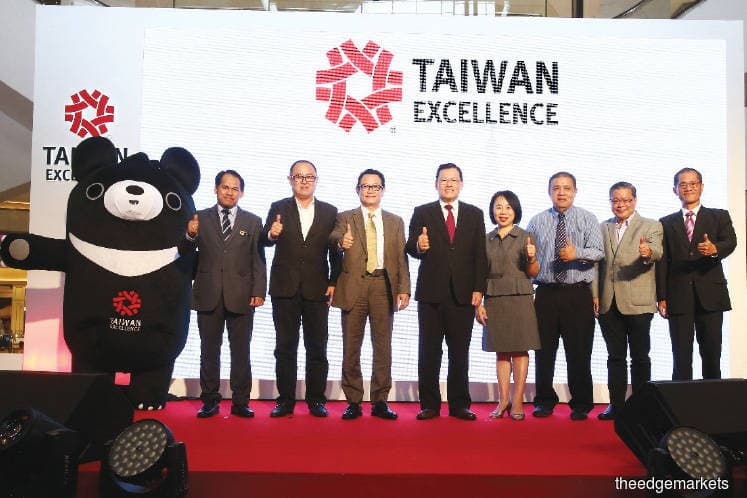
This article first appeared in The Edge Financial Daily on July 20, 2018
Taipei Economic and Cultural Office in Malaysia representative His Excellency Ambassador James Chang Chi-ping bids farewell to Malaysia today after three years as Taiwan’s chief of mission to Malaysia — leaving his mark as the most high-profile Taiwan diplomat to be based in Malaysia.
Chang’s exposure and accessibility to the local media while being here has certainly helped in boosting bilateral ties between the two nations. Based here for some three years, he was the main go-to person for all things Taiwan, reflecting his importance to the latter.
He has also provided inimitable insight into his home country — a quality that can be traced to his background as a journalist before he joined Taiwan’s foreign ministry. He was a spokesman for the ministry in Taipei where he had helmed weekly, and sometimes even daily press briefings.
In an interview held this week at the Taipei Economic and Cultural Office in Malaysia, Chang said he would always cherish his time spent in Malaysia.
“The thing I find most amazing about Malaysia is the people. They are very friendly and so ethnically diverse,” Chang said, adding that he would miss Malaysia a lot.
The other bit which he will not be forgetting in a hurry is his experiece with Malaysian food. Chang said he has had outstanding gastronomic experiences with Malaysian cuisine spanning multiple cultures, namely Malay, nyonya, Chinese and Indian.
There is a “brilliant use of spices like curry which makes for memorable feasting with a wide variety of delectable snacks and desserts thrown in”, said Chang.
Upon returning to Taiwan, the senior official said he would continue his service with the nation’s foreign ministry.
During the interview, Chang also said “bilateral relations are now at their best with Taiwan’s New Southbound Policy seeking to focus on Asean markets and Malaysia is one of the key countries under the policy”.
The ambassador said through various integrating opportunities such as the Taiwan Excellence events and the annual Taiwan Expo, Taiwan hopes to introduce more successful Taiwan companies into the Malaysian market.
“Compared with last year’s Taiwan Excellence, we have seen a growth in Taiwanese exhibitors participation by 50%. Via the Taiwan Excellence, we hope to engage Malaysians and Taiwanese to explore collaboration opportunities that allow for the exchange of skills and techniques, among others,” he said during the farewell interview.
Established in 1993, the Taiwan Excellence Awards is a yearly award given out by Taiwan’s ministry of economic affairs and the Taiwan External Trade Development Council (Taitra) to encourage industries in Taiwan to upgrade and incorporate innovation and value into their products. Each year, eligible candidates are required to undergo a rigorous and stringent selection system that covers four major aspects — research and development, design, quality and marketing — to identify outstanding products that offer innovative value.
All products bearing the symbol of Taiwan Excellence serve as examples of the country’s domestic industries. The mark of Taiwan Excellence has come to symbolise the innovative values of Taiwanese products and is renowned worldwide for their excellence and quality.
Chang said that Taiwan Excellence provides a platform for Taiwanese businesses to be promoted worldwide as a representation of Taiwan’s innovation and creativity.
“It also offers Malaysians first-hand experience with Taiwan’s products, and for Malaysian entrepreneurs to explore business and trading opportunities with Taiwan,” he said.
Trade between Malaysia and Taiwan is expected to grow 10% this year, from US$17.5 billion in 2017, to be driven mainly by the information and communications technology industry, which is also Taiwan’s featured industry. In 2017, trade between the two countries grew 24.3%, compared with 2016.
In 2017, Malaysia’s exports to Taiwan grew 11.3% year-on-year to RM23.63 billion; Taiwan was ranked 14th among Malaysia’s export countries. Malaysia’s imports from Taiwan grew 30.9% to RM54.75 billion, and Taiwan was the country’s fifth largest importer. Malaysia was the seventh largest trading partner of Taiwan in 2017.
“From trade statistics, trade between Taiwan and Malaysia is getting higher and higher and growing steadily every year, which is really a good sign for the current and further investments,” said Chang.
He said a total of 1,700 Taiwan businesses have operations in Malaysia. “Their operations are running well in Malaysia with 100,000 workers being employed.”
In the tourism segment, Chang said arrivals of Malaysian tourists to Taiwan rose 11.3% to 528,019 in 2017 from 474,420 in 2016. The number of Taiwan tourists to Malaysia grew 10.7% to 332,927 in 2017 from 300,860 in 2016.
The chief of mission said among Asean countries, tourists from Malaysia were prominent to Taiwan.
He said Taiwan was looking for more tourists from Malaysia, including Muslim tourists as his country has about 150 halal restaurants and up to 13 tourist spots equipped with prayer rooms for Muslims.
In education, of the 30,000 Asean students in Taiwan, Malaysia has the highest share at 48%. Chang said there were 17,079 Malaysian students studying in Taiwan compared with 14,942 students two years ago.
“In my travels throughout Malaysia, I have made very good friends in the past three years and I have felt the strong will among the people to strengthen cooperation between Taiwan and Malaysia,” he said.
“I will remember my experience in Malaysia. I will continue to do whatever I can to encourage better Taiwan-Malaysia relations.”
During the interview, Chang said he would miss his colleagues and commended them for a job well done.
During Chang’s tenure, Selangor and Taipei signed a cooperation agreement on transportation, innovative industries, e-commerce and smart cities during Taipei mayor Ko Wen-je’s visit to Malaysia (March 27, 2017).
On April 5, 2017, the Taiwan International Ports Corp signed a memorandum of understanding with Sabah Ports in line with the Taiwanese government’s “New Southbound Policy” to develop Southeast Asian markets.